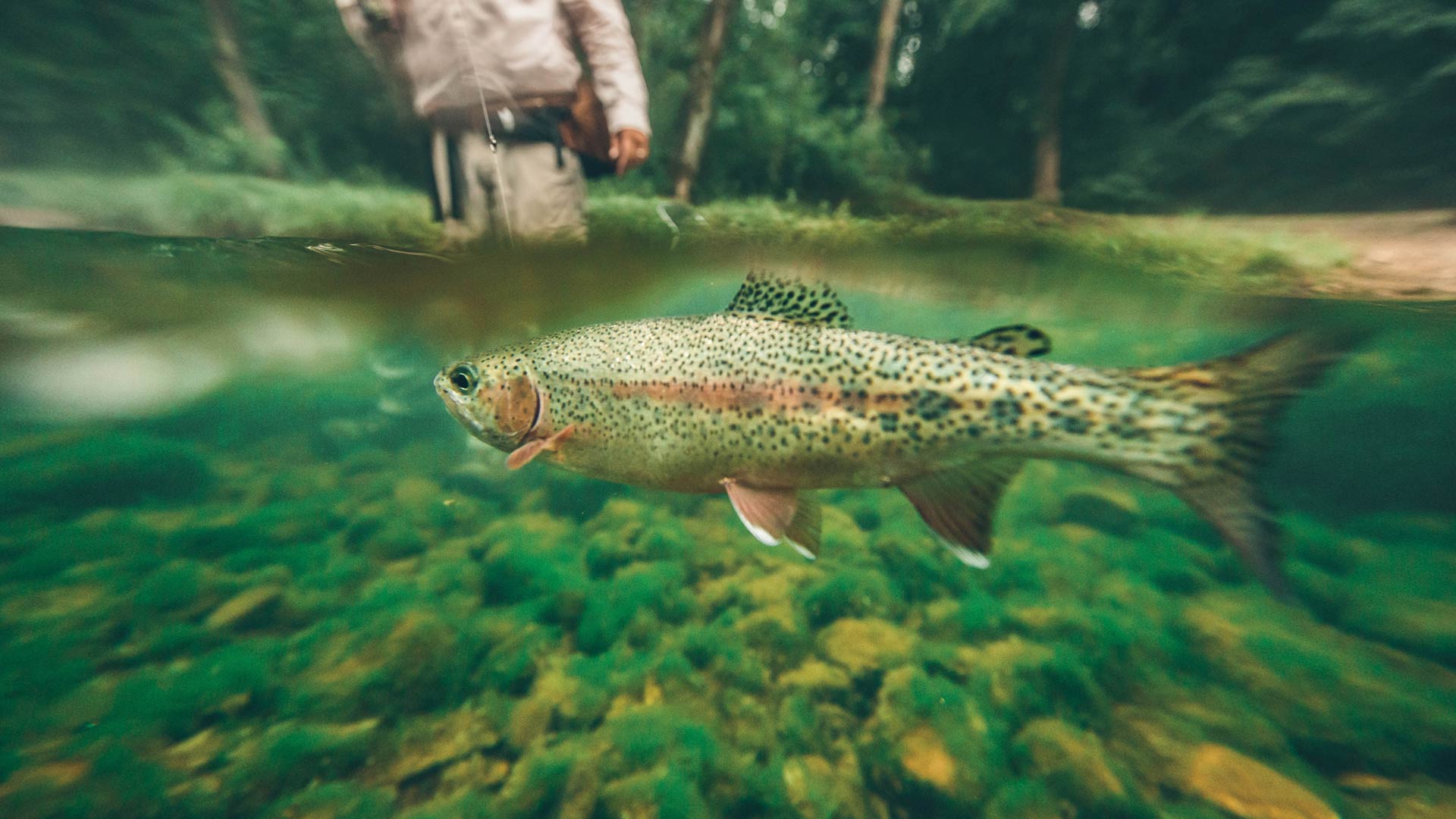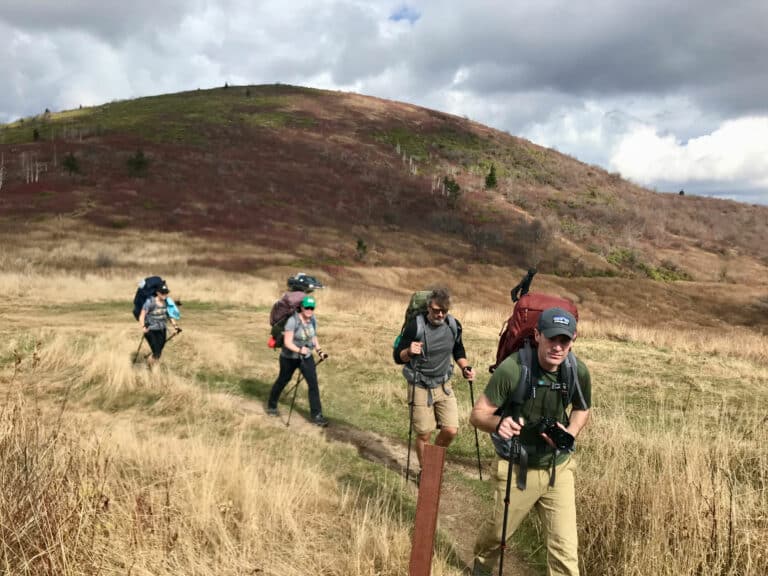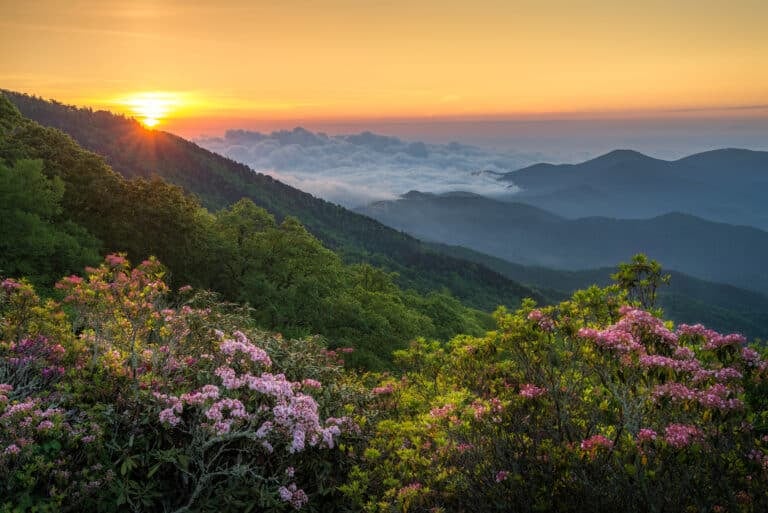Resorts and landowners are blocking river access to anglers
Solitude is a good thing when it’s just you, a fly rod, and an Appalachian stream—which may explain why some resorts and private landowners are inclined to add “No Trespassing” signs to the streamside ambience.
A few recent steps in that direction on the upper Watauga River reflect how the trend is playing out in the North Carolina High Country.
Five years ago, a rushing, rocky stretch of popular public-access river was posted with “No Trespassing” signs. Once managed and stocked by the North Carolina Wildlife Resources Commission, the river near Hound Ears Club sprouted “towing enforced” signs and roadside boulders to eliminate parking. The once idyllic sight of anglers casting near the upscale resort largely disappeared until 2016, when Hound Ears officially opened a new private fishing area where “members, property owners and guests may enjoy a picnic meal or grill out at the designated table in full view of this picturesque stream.”
That closure deleted the public from a popular piece of what Hound Ears boasts is “one of the top-rated rivers in North Carolina for fly-fishing.”
Already privatized adjacent properties on this prime section of river range from a Christian alcohol rehabilitation facility to the Twin Rivers development, both of which stock the river for paying guests or members.
Twin Rivers attracted attention to a growing regional trend last winter with an explosion of metal signs along N.C. Highway 105. One large sign dangles on cables over the river and asserts its exclusivity. Resort expansion in the area has also closed other once publicly accessible fishing sites, among them Blowing Rock’s Chetola Resort.
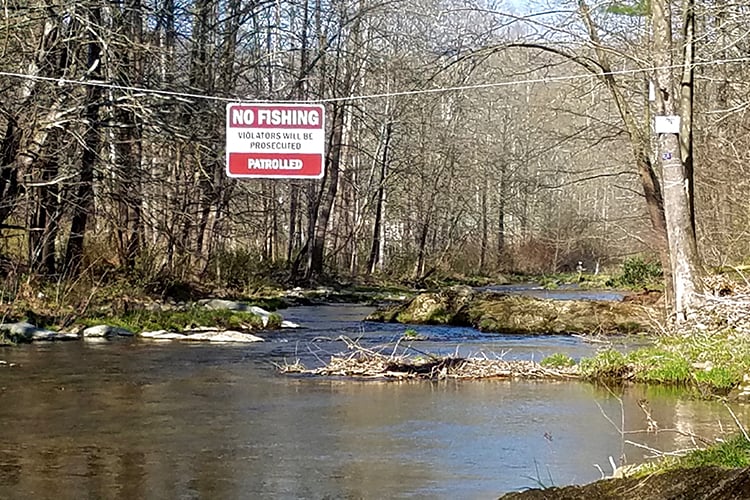
Stream privatization received added attention recently when local fly fishing outfitter Patrick Sessoms spoke out against the practice in last fall’s Boone Film Festival.
Since starting Due South Outfitters eight years ago, Sessoms says “there are a lot of places that are no longer accessible.” He faults a few factors, including landowners “who turn their property into a cash cow by privatizing streams for private trout fishing clubs, and resorts that market trout fishing in the Southern Appalachians, but that’s not what you get,” he maintains. “We call it country club fishing. It’s like turning streams into trout ponds.”
The trend, Sessoms says, “stokes the egos of Instagram celebrities who post pictures of whale-sized, pellet-fed trout that no one would ever net on a real stream.” Sessoms guides exclusively on streams accessible to the public so his clients “know what the public fishing experience is like and can duplicate it, instead of just experiencing someone’s private honey hole.”
The problem is not just limited to the High Country of North Carolina. Streams across Southern Appalachia are becoming increasingly privatized, which makes public lands and waterways even more important. Gil Willis and wife Mary own Elk River Touring Center in Slatyfork, W.Va., a 150-acre former homestead with an inn, restaurant, and access to a long stretch of the Elk River for fly fishing. Willis expects that there will be less access to private land and streams in the future due to the increasing pace of development throughout Southern Appalachia. “West Virginia is lucky,” Willis says. “If we didn’t have all this public land, it’d be a different story. Here in Pocahontas County, it’s 64% state and federal land. No wonder it’s called the birthplace of eight rivers.”
Outfitters and guides may play their own role in the problem, says Doug Besler, Mountain Region Fisheries Supervisor for the N.C. Wildlife Resources Commission.
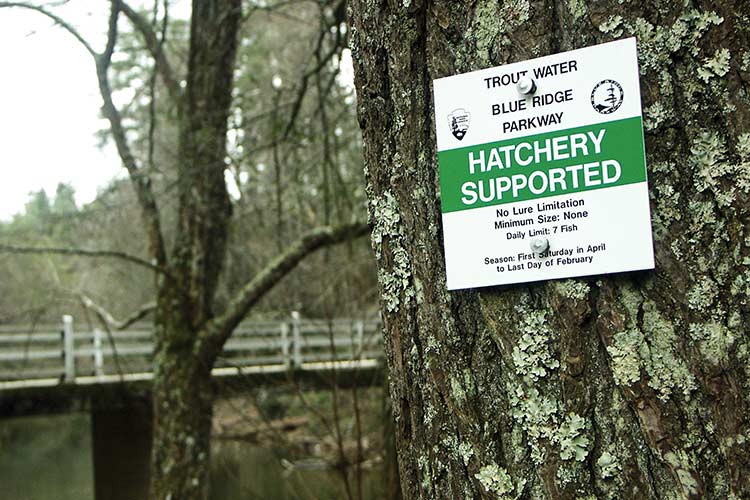
Outfitters and guides may play their own role in the problem. Doug Besler, Mountain Region Fisheries Supervisor for the N.C. Wildlife Resources Commission, noted that many outfitters and fishing clubs are now leasing a section of river and stocking it.” He’s not sure if that accounts for loss of public access to other streams, “but it’s a factor.”
Southern Appalachian resorts have long commercialized fly fishing. The resort town of Linville got its start in 1892. Angling images from that era still adorn the chestnut-paneled walls of Eseeola Lodge. For a fee, public lodge guests can cast on a private five-mile stretch of the Linville River. Under the director of outdoor programs Alan Burchell, anglers have a full range of rentals and lessons to enjoy as they fish reservable sections of the river called beats. Linville’s seventeen beats lie between Grandfather Golf and Country Club on the north and southerly Linville Land Harbor.
The private status of the river was more noticeable recently when stream habitat improvements were undertaken, including deepening pools, improving oxygenation, and eliminating two nearby ponds that fed warm water into a stream that trout prefer to be cool.
Burchell touts these improvements as “some of the good things that come with having a private part of a stream. We can truly mandate that anglers use barbless hooks and practice catch and release.” And the benefits, he asserts, flow downstream.
Ensuring the exclusivity of such private waters and compliance with the rules requires security that can range from video surveillance to hired wardens who patrol daily and even at night.
“Fifteen years ago, there was more water available to the public,” admits Burchell, a longtime Southern Appalachian angler. “We’re becoming more limited on put-ins and takeouts, too.” That limitation also affects paddlers and swimmers. Uncontrolled parking beside an overly popular swimming hole were factors in the Hound Ears river closure.
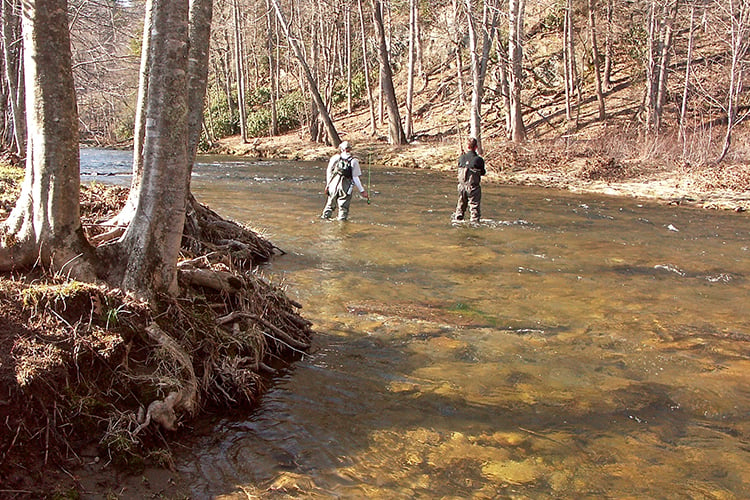
Wildlife officials stress that anglers can help forestall exclusion from private land by being courteous to property owners and being sure that they park discreetly, close gates, don’t litter, and ask when uncertain.
“Back in the 1950s, there were large tracts with single family owners, and the fishermen knew the owner,” says the N.C. Wildlife Resources Commission’s Doug Besler. “Things have certainly changed.” Over time, large tracts were broken up and development has increased. “We’ve definitely seen a trend of decreasing access.”
Privatization may sound bad to some eco-types, says Besler, but “most hatchery-supported streams are on private land with access to the public through the sheer generosity of landowners. Each year they permit us to stock 1500 miles of streams in North Carolina with almost a million fish. It’s a wonderful partnership with private citizens.”
“I’m just thrilled we have 300 miles of public waterways,” adds Alex Dale, owner of Highland Outfitters in Linville and Foscoe Fishing Company. “We have more people on this planet than we did ten years ago, and a bigger portion of those people may have just started fishing.”
But keeping streams open remains an uphill battle given the misperceptions out there. “Many landowners think they’d be liable for granting access, so the natural instinct is to post the property,” concludes Besler. “But the law in North Carolina is clear—landowners are not liable for fishermen and hunters on their property.”
Anglers, too, have blind spots. In some states, you can fish any stream below the high-water line, but “that’s definitely not the case in North Carolina,” assures Besler. “The landowner owns the bottom of the stream. The water and fish are public trust. People are surprised by that.” Many also think they have access to any “navigable river,” but even “that’s a big source of confusion. Maybe that’s the French Broad in Asheville,” but not mountain streams, even in a kayak.
Cynicism and outrage are understandable with exclusion of the public, but there are positive developments. Two new sections of the Watauga have also been designated for public access and stocked by the N.C. Wildlife Resources Commission, including the mile-long ribbon centered on Valle Crucis Community Park, a privately owned, non-profit-run parcel. Two Watauga River put-in parks are being developed. And Boone’s expanding greenway system and Brookshire Park, both on the South Fork of New River, permit trout fishing inside of town.
“Public access is vital to conservation,” says Watauga Riverkeeper Andy Hill. “The more people who enjoy the resource, the more people who will want to protect it.”
